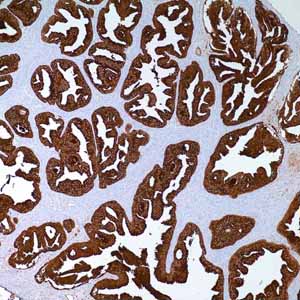
PSA (ER-PR8)

Prostate-Specific Antigen (PSA) is a 33 kDa protein primarily produced by the prostatic epithelium and the epithelial lining of the periurethral glands 1. PSA is strongly expressed in both normal and neoplastic prostatic tissue. Although PSA can be considered prostate-specific, PSA and/or PSA gene expression has been detected at low levels in some extra-prostatic tissues such as normal breast tissue, breast tumors, endometrium, adrenal neoplasms and renal cell carcinomas 1, 2, 3. Anti-PSA is most useful in determining the prostatic origin of carcinomas in non-prostate tissues (metastatic disease) using IHC techniques. This product is best used in conjunction with a panel of antibodies as, up to 27% of prostate carcinoma cases (predominantly poorly differentiated carcinomas) can be negative for this marker.4
